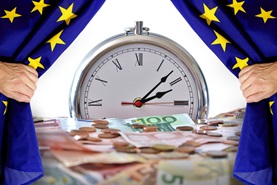ESG in Conversation: Shining a Light on Shareholder Rights
Tune in to hear experts share their perspectives on sustainable investing trends and the changing regulatory landscape, as well as changes in proxy voting activities, the influence of dual class share structures and their impact on say on pay votes.
Mandatory Scope 3 Emissions Reporting in the U.S. and Canada: Most Companies Are Unprepared
Learn just how prepared U.S. and Canadian companies are for the proposed scope 3 emissions disclosure rules and how investors can leverage engagement to help companies meet the various challenges of GHG emissions reporting.
ESG Data Market Gaps: 3 Areas of Interest for Investors Measuring Material ESG Risk
Many global investors already incorporate ESG factors into their evaluation of public companies across developed markets. We are now observing increasing interest in applying ESG considerations across a broader set of asset classes and regions.
Correlation of Business Ethics and Corporate Culture - 5 Lessons from the Banking Industry
To protect a company’s reputation and economic position, its employees play an essential part in organisational risk mitigation strategy by demonstrating consideration for systemic business risk, taking accountability, and being willing to escalate concerns. Companies with a strong, ethical corporate culture have much to gain—improved employee performance, morale, and retention, and in the long run, bolstering the bottom line.
What Happens When Companies are Receptive to Investor Feedback on ESG?
When companies are receptive to investor feedback, there are clear real-world impacts and positive changes. Such engagement outcomes vary and are directly tied to the company and its company-specific exposure to material ESG issues.
3 Reasons to Skill Up and Scale Up ESG Stewardship in 2022
As our clients and the industry at large focus on proactively mitigating risk and capitalizing on this evolving landscape, stewardship will be a key lever for savvy investors—particularly those facing external pressure to divest. Here are the ESG themes we see influencing stewardship priorities this year.
SFDR and EU Taxonomy Product Disclosure Rules Finally Released
The publication of these rules marks the end of a prolonged period of uncertainty in the market around final rules and timelines - assuming the RTS will be adopted as-is in a Delegated Act, which turns these rules into regulation. There are several noteworthy aspects to these rules, which we address from our perspective in this article.
Recent market trends put engagement and voting front and centre for responsible investors
From a market perspective, engagement and voting on governance issues have been used as levers for influence for a long time. On the other hand, environmental and social issues were historically addressed from a values-based perspective or primarily for fact-finding purposes. Today, many responsible investors leverage corporate dialogue as a tool to influence and drive meaningful change and impact
North American Material Risk Engagement Trends: ESG Reporting Frameworks, Emission Reduction Targets and Beyond
There are many factors that rating agencies consider within its overall assessment. For example, ESG rating companies tend to look for at least three years of ESG metrics to determine company trends and long-term ESG targets, goals, and strategies to manage and reduce ESG risks at least five years ahead. Read on to learn about how Sustainalytics' Material Risk Engagement program promotes and protects long-term value by engaging with high-risk companies on financially-material ESG issues. (A North American Snapshot)
Royal Dutch Shell Court Order Shifts Paradigm for Corporate ESG Accountability
On 26 May 2021, the Court of The Hague orders Royal Dutch Shell (RDS) to reduce CO2 emissions to a net 45% by the end of 2030 compared to 2019 through the Group Policy of the Shell Group. The order of a national (Dutch) court demands that a global company (RDS) fulfills its obligations under the Paris Climate Agreement, although RDS was not a party in that agreement, and there is no legal equivalent in The Netherlands. What are the broader consequences of this order, also globally and for other companies and potentially also other jurisdictions?














